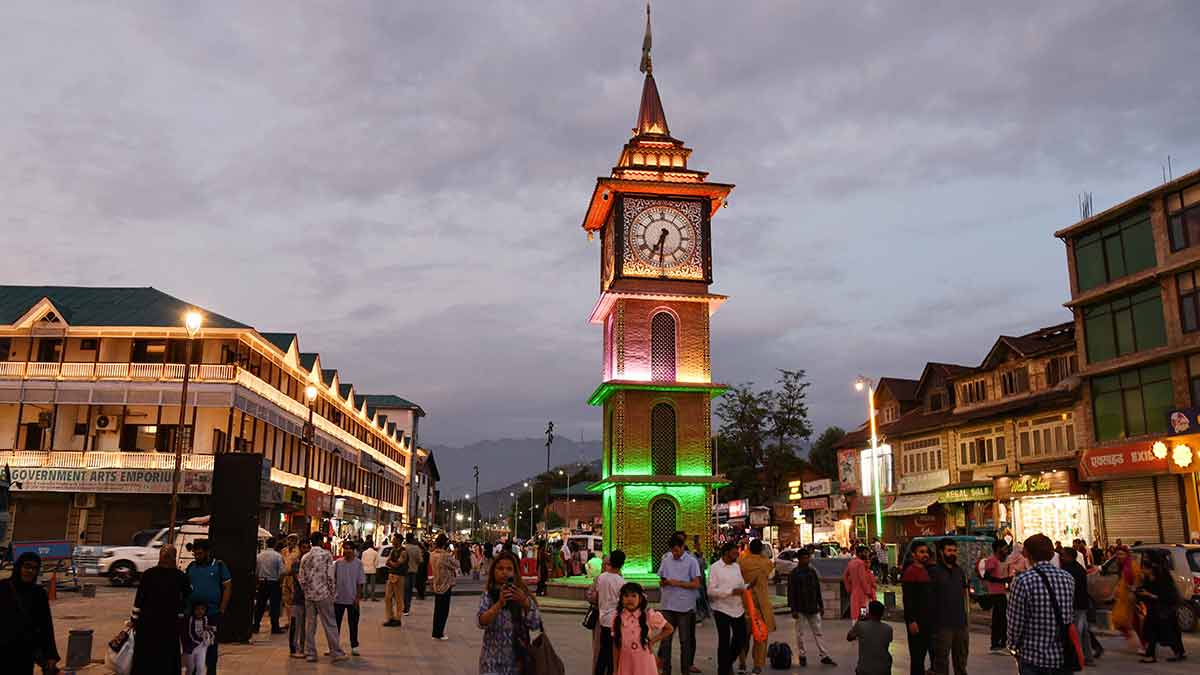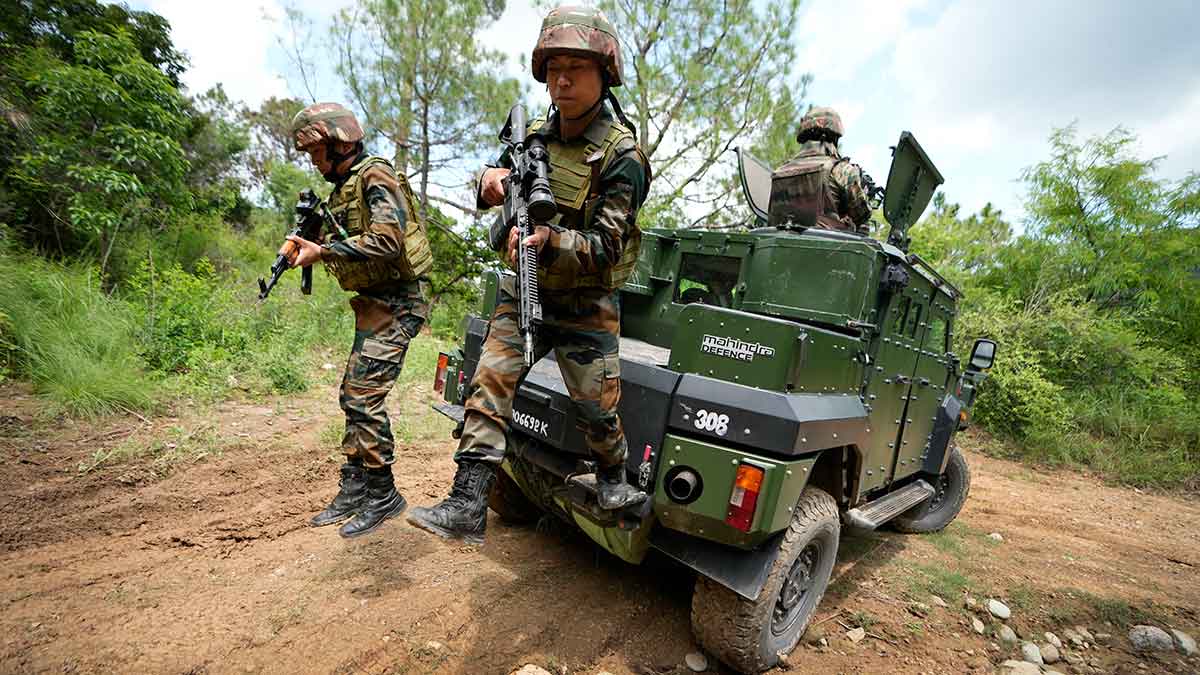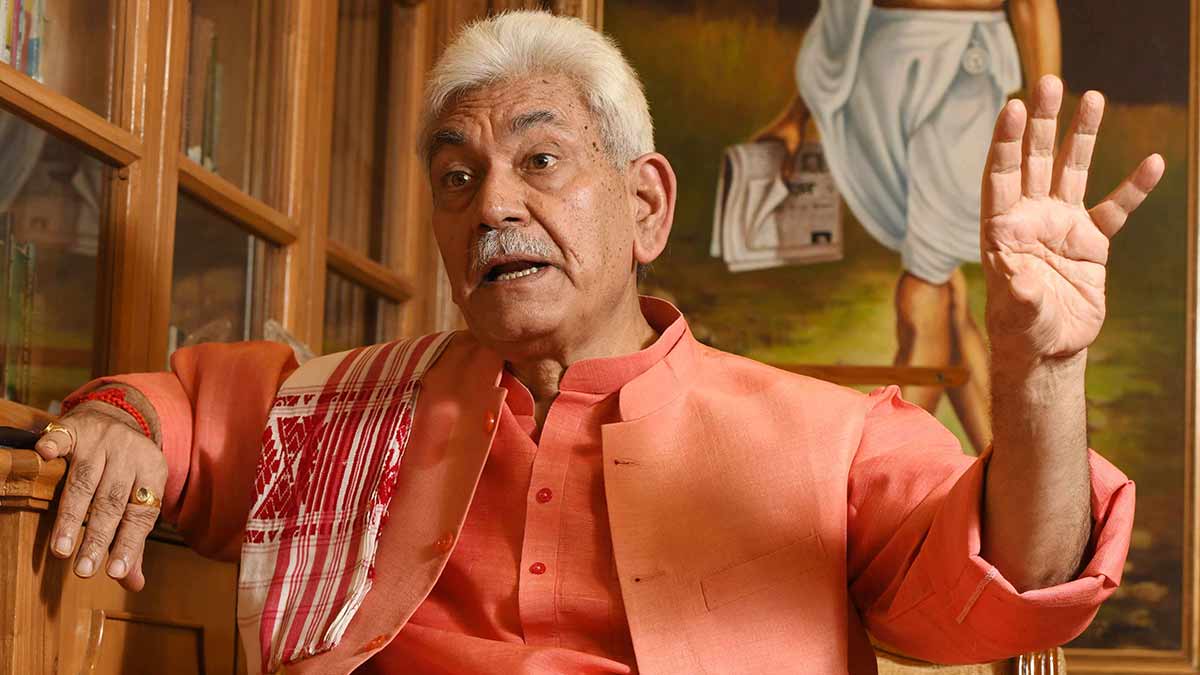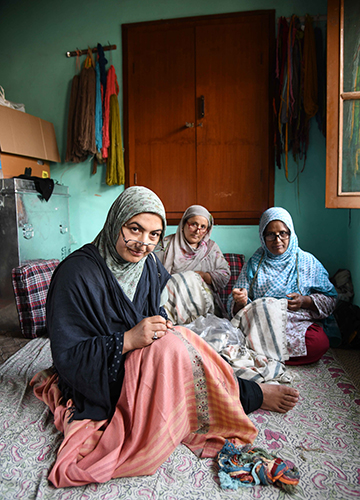When Sheikh Abdullah was sworn in as chief minister on July 9, 1977 after the National Conference won the assembly polls, it marked the end of the first spell of governor’s rule in Jammu and Kashmir. The polls were regarded as the first free and fair elections in the state, where large-scale rigging had dented the credibility of the democratic process, and the credit went to prime minister Morarji Desai.
Manoj Sinha, lieutenant governor of Jammu and Kashmir, says free and fair elections were held for the second time in the state in 2002 when A.B. Vajpayee was prime minister and the third time in 2014, after Narendra Modi became prime minister. “Otherwise, there used to be a collector saab here and two kinds of MLAs were chosen―one by the public and the other by the collector saab,” says Sinha in an exclusive interview with THE WEEK. And he thinks the Union territory is ready for another free and fair election. “In the past five years, after the abrogation of Article 370, people’s faith in the Constitution and democratic process has gone up,” he says.
A three-time Lok Sabha member from Ghazipur, Uttar Pradesh, Sinha was a minister of state in the first Modi government. He was said to be in the race for the post of Uttar Pradesh chief minister when the BJP won the assembly elections in 2017. He took charge as lieutenant governor of Jammu and Kashmir in August 2020.
Sinha is a postgraduate in civil engineering, and he started his political career while studying at the Indian Institute of Technology (Banaras Hindu University) Varanasi, where he was elected president of the students’ union. A portrait of his idol Pandit Madan Mohan Malviya, who founded BHU, adorns a wooden bookcase in Sinha’s office in Srinagar. “Mahamana (Malviya) worked tirelessly to raise national consciousness among people,” he says. Sinha asserts that the sovereignty and integrity of the country are non-negotiable. “Constructive criticism is always welcome,” he says. “But if there is criticism that fuels terrorism in Jammu and Kashmir, threatening the unity and sovereignty of the country, then it is dangerous.” Edited excerpts from the interview conducted at the Raj Bhawan on August 11:
Q/ The Election Commission has set the ball rolling for the assembly elections in Jammu and Kashmir. Is the environment conducive for polls?
A/ When Article 370 and 35(A) were abrogated on August 5, 2019, the Union home minister said in Parliament that there would be delimitation first, then assembly elections and statehood at an appropriate time. This was reiterated by Prime Minister Narendra Modi as well. Recently, when the prime minister addressed a public meeting in Jammu and Kashmir, he said assembly elections would be held soon. The Election Commission was here for a few days and held consultations with all stakeholders. On behalf of the administration, we told them that the assembly elections could be held.
It is pertinent to note that after the J&K Reorganisation Act, the number of assembly seats had gone up. A need arose for demarcation of boundaries and the Delimitation Commission was constituted to carry out this work. It is a time-consuming exercise. The commission, set up under Justice Ranjana Desai, made visits to J&K and held meetings with stakeholders in J&K and Delhi. The recent Lok Sabha elections were an indicator that J&K was ready for polls. We saw more than 58 per cent voter turnout, especially in the valley, which is the highest in three and a half decades. We can easily conclude that the atmosphere is conducive to polls.
 Lasting peace: People on the streets late night at Lal Chowk in Srinagar | Sanjay Ahlawat
Lasting peace: People on the streets late night at Lal Chowk in Srinagar | Sanjay Ahlawat
Q/ How confident are you that the elections will be free and fair?
A/ The conduct of free and fair elections used to be a huge challenge in J&K. If you ask the common man, he will tell you that free and fair polls have been held only thrice―when Morarji Desai, Atal Bihari Vajpayee and Narendra Modi were prime ministers. Otherwise, there used to be a collector saab here and two kinds of MLAs were chosen―one by the public and the other by the collector saab. In the last five years, after the abrogation of Article 370, people’s faith in the Constitution and democratic process has gone up. This message has been conveyed to the people of this country and the rest of the world. It has definitely been an achievement to conduct free and fair general elections. I am confident that there will be free and fair assembly elections in Jammu and Kashmir.
Q/ You served as lieutenant governor for four out of five years in J&K since the abrogation of Article 370. When you look back, what are the achievements? Is there unfinished work?
A/ I see the past five years as the dawn of peace, prosperity and development in J&K. Under the vision of PM Modi, we got the strength to fulfil the aspirations of people and usher in development without discrimination. The women of J&K were deprived of basic rights like entitlement to property if they were married outside the state. The large-scale discrimination came to an end with the abrogation of Article 370. Benefits have been extended to Scheduled Castes, Scheduled Tribes and Other Backward Classes, even as reservation under ST category was extended to communities like Paharis and Gujjar-Bakarwals. Voting rights have also been given to west Pakistani refugees.
A three-tier panchayati raj system has been implemented and social security schemes have brought relief to the old and widowed. The patwari raj is over, as all land records have been digitised. The common man feels empowered as there is transparency and accountability in the system. The Public Services Guarantee Act allows citizens to avail more than 1,100 online services that are time-bound.
Another key indicator of development is air, road and rail connectivity. Highway and tunnel projects worth Rs1.5 lakh crore are under implementation. The travel time from Jammu to Srinagar has reduced from eight to five hours. Villages with at least 250 people are connected by roads. The Katra-Delhi greenfield expressway will be operational this year. Srinagar has 140 flights daily, against 20 or 22 earlier, while the number of flights from Jammu has grown from six to 48 a day. The Kashmir-Kanyakumari rail link will be operational this year. Tourist influx, too, has increased more than two and a half times to 2.11 crore last year.
After independence, the total private investment was Rs13,000-14,000 crore till 2021. After we announced the new industrial scheme, we have received investment proposals to the tune of Rs1,25,000 crore. Currently, projects worth Rs28,000 crore are on the ground and some of them will get completed in a few months, while others may take a few years.
Q/ How are you dealing with unemployment?
A/ Nearly 43,000 government jobs have been given in the past five years. The focus is also on self-employment by giving financial help for enterprises. Jammu and Kashmir has achieved the first rank among all states and UTs for projects established under the prime minister’s employment generation programme for the year 2023-24. During 2023-24 alone, employment has been generated for 1,20,296 people. Significant work is being done in agriculture, horticulture and allied sectors for creating more job opportunities for the youth. More than eight lakh self-employment opportunities have been created in the past five years. We aim to create more than eight lakh self-employment opportunities through the synergy of Central and UT administration schemes.
Besides, nearly nine lakh women are affiliated to self-help groups and special support is being given to the handicraft sector. Handloom and handicraft exports have doubled from 0563 crore in 2021-22 to Rs1,162.29 crore in 2023-24. In the handicraft and handloom sector, 5,682 cooperative societies have been registered in J&K, a massive increase of 1,800 per cent from 2020.
Forty-six new industrial estates are coming up and the New Startup Policy 2024-27 will provide fiscal and non-fiscal support to startups, thus spearheading the rise of Jammu & Kashmir entrepreneurs in the national and global startup ecosystem. The number of startups registered with the department for promotion of industry and internal trade increased to 825 in 2024. A total of 1,600 startups and 269 women-led startups have been registered with the Entrepreneurship Development Institute of India.
Q/ Is the terror theatre shifting from Kashmir to Jammu?
A/ When I first came to Jammu and Kashmir, the terror threat in the valley was a major area of concern for the entire country, and a strategy was formulated to counter it effectively. It is not just statistics, but there are no stone-pelting incidents today and people are leading normal lives. There is a sharp decline in the killings of civilians as well as security personnel. Almost all terror commanders of terrorist groups have been eliminated by security forces. Even the local recruitment is at the lowest levels.
The neighbour (Pakistan) is feeling the heat and anxious after seeing peace, development and the faith in the democratic system displayed during the recent Lok Sabha elections. Pakistan has suddenly become active and is pushing in terrorists. A large number of terrorists are present at launch-pads across both Jammu and Kashmir regions. For the past one and a half years, Pakistan has been trying to create disturbance in the Jammu region, which remained peaceful for almost 15 years.
As peace prevailed, security forces deployed in the upper reaches had been withdrawn over time. It is unfortunate that terror attacks have taken place in the past 3-4 months, claiming lives of soldiers and citizens. The Union home minister is revising the strategy, and the Army, the CRPF and the J&K Police are strengthening their deployment in upper reaches. I am hoping there will be a turnaround in the terror situation in Jammu in the next three months.
Q/ Has fresh infiltration taken place, resulting in terror attacks in Jammu?
A/ It is true that infiltration has taken place both in the Jammu and Kashmir regions. The recent encounter in Anantnag was the direct fight between security forces and terrorists at nearly 10,000 feet. The terrorists are trying to take advantage of the heights, but we are confident that our security forces will be successful. When there was ceasefire between India and Pakistan, people on both sides benefited, but the neighbour became unhappy. Security forces have noticed the use of tunnels and nullahs to send in terrorists. Pakistan is unable to provide any facilities to its people on the other side of the border and is trying to create disturbance here to deflect attention. We have defeated their designs in the past and will give an adequate response. We are not just doing a headcount of terrorists, but dismantling the entire terror ecosystem by identifying those who are lending logistic and financial support to terrorists. We have sacked more than 70 government employees who were part of this ecosystem.
Q/ The Union government has given more powers to the LG. There is concern that the powers of the elected chief minister will be diminished.
A/ There is no truth in it because these powers were already there in the Jammu and Kashmir Reorganisation Act, 2019. It was enacted by Parliament and has the stamp of the Supreme Court. People who take oath on the Constitution of India should not raise this question. There has been no amendment because that would have required approval by Parliament. It is just a notification issued by the government. It is not very different from any other Union territory in the country. And if both the elected government and the lieutenant governor work towards peace and progress, how can there be any difference? The elected government will get complete support of the office of the LG if it wants to work towards peace and development of Jammu and Kashmir.
 Keeping vigil: Army men arrive for a mock drill along the Line of Control in Kashmir | AP
Keeping vigil: Army men arrive for a mock drill along the Line of Control in Kashmir | AP
Q/ A similar arrangement in Delhi has seen a constant slugfest between the LG and the elected government.
A/ I would like to remind you that Delhi also had an elected chief minister in Sheila Dikshit for 15 years and there was a period when the Vajpayee government was at the Centre, but there was no clash of any kind. In fact, the transfers and postings of police officers used to happen on the recommendation of Dikshit. I firmly believe that if a fine balance is maintained and the objective is peace, a flourishing economy and the welfare of people, then there should not be any clash.
Q/ Are you concerned about hartals, bandhs and political violence returning to J&K when the political process begins?
A/ If there are protests by common people or political parties in a democratic way and within the tenets of the Constitution, then I have no problem. But if there are actions that endanger the safety, sovereignty and integrity of the country or challenge the unity of the nation, then I will exercise the powers vested in me by the Constitution.
Q/ It is said that the voice of dissent has been crushed in J&K. How will you ensure that people are able to express difference of opinion?
A/ There are many platforms for the voice of the common man to be heard, and his voice is being heard. It is a small section that feels its voice isn’t heard. I would like to take this opportunity to tell people that it is their democratic right to criticise our work if there are deficiencies. Constructive criticism is always welcome. But if there is criticism that fuels terrorism in Jammu and Kashmir threatening the unity and sovereignty of the country, then it is dangerous. Freedom of speech is not an absolute right; it requires responsibility as well, and the makers of our Constitution spoke of caution while exercising it. It is only people who want to misuse these platforms who have a problem. The common man has no problem.
Q/ The Lok Sabha elections saw an independent candidate, Engineer Rashid, who contested from prison getting elected. Is there an apprehension that the separatist sentiment is still alive in J&K?
A/ Many seats in the country have seen such people come to power. In our democratic system, there is no way to stop anyone from fighting elections. But sometimes an emotional appeal can become an issue, but those who whip up sentiments to garner votes cannot fool voters for a long time. We also expect voters to understand that when they praise the peace process and want development and progress, they should also remember that if they vote for those who work against that, peace process can never bring success.
Q/ Do you see new leaders emerging in the assembly polls? There are allegations that the Centre may prop up proxies.
A/ I feel some new faces will surely enter the election fray this time. I completely deny that the government is propping up any proxies in the polls. The Lok Sabha elections are proof that the Central government did not prop up any proxies. Otherwise how could these people (like Engineer Rashid) win?
Q/ The proscribed Jamaat-e-Islami is planning to contest the assembly polls. Is a banned organisation allowed to mobilise people during the polls?
A/ There is no law that stops anyone from fighting elections. If Parliament makes a law, then they can be stopped. But until that happens, anyone can fight elections. But the ban will continue and whatever action needs to be taken as part of the implementation of the ban will continue.
Also Read
- Omar Abdullah mulls legal action against LG Manoj Sinha's move to nominate 5 MLAs to J&K Assembly
- How Jammu and Kashmir is gearing up to hold its first assembly election in a decade
- J&K assembly polls: What's at stake for political parties, and the people
- 'Supporting village defence committees to deter terrorists': DGP, J&K Police
Q/ Will statehood be restored in J&K after the elections?
A/ The sequence will remain the same as outlined by the home minister. Statehood will be restored at an appropriate time. Let us wait for an appropriate time.
Q/ What about withdrawal of the Armed Forces (Special) Powers Act?
A/ There have been terror incidents in J&K, but when things return to normalcy we can surely think about it.
Q/ Will the panchayat elections happen next year?
A/ We could have held panchayat and urban local bodies polls earlier but it was important that the reservation for OBCs is implemented. Parliament had to make changes. Now, after the completion of the assembly polls, the elections to the panchayats and urban local bodies can be held. It can happen this year itself if the weather permits.
Q/ What is the way forward for Pakistan-occupied Kashmir?
A/ We have already reserved two seats in the assembly for Kashmiri pandits and one for displaced residents of Pakistan-occupied Kashmir. The government of India has already taken care of it and the way forward will be decided by New Delhi.



